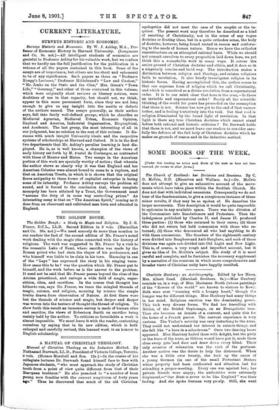C IJRRENT LITERAT URE.
SURVEYS HISTORIC AND ECONOMIC.
Surveys Historic and Economic. By W. J. Ashley, M.A., Pro- fessor of Economic History in Harvard University. (Longmans and Co. 9s. net.)—All intelligent students of economics are grateful to Professor Ashley for his valuable work, but we confess that we hardly see the full justification for the publication in a volume of all the papers contained in this book. Some of the essays are of importance, but others are too short and ephemeral to he of any significance. Such papers as those on "Professor Knapp's Lectures," Professor Hildebrand's "Law and Custom," "Mr. Jenks on the State and the Clan," Mrs. Green's "Town Life," " Gournay," and other of those contained in this volume, which were originally short reviews or literary notices, were doubtless of use in that capacity, but should not, we think, appear in this more permanent form, since they are not long enough to give us any insight into the merits or defects of the authors named. The essays generally, as their author says, fall into fairly well-defined groups, which he classifies as Mediteval Agrarian, Medisaval Urban, Economic Opinion, England and America, Industrial Organisation, Biographical, and Academic. The last group, the most interesting of all in our judgment, has no relation to the rest of this volume. It dis- cusses with much insight University ideals and the respective systems of scholarships at Harvard and Oxford. It is in the first two departments that Mr. Ashley's peculiar learning is best dis- played. He is, as is well known, a champion of the views of early history set forth by M. Fustel de Coulanges, as contrasted with those of Maurer and Maine. Two essays in the American portion of this work are specially worthy of notice ; that wherein the author shows so clearly why it was that England and her American Colonies were almost bound to come to a rupture, and that on American Trusts, in which it is shown that the original fierce antipathy to these forms of capitalist enterprise is losing some of its intensity. Professor Ashley surveys the problem all round, and is forced to the conclusion that, where complete monopoly has been attained by a Trust, the Government must " assume the duty of in some way controlling prices." An interesting essay is that on "The American Spirit," coming as it does from an observant and cultivated man born and educated in England.






































 Previous page
Previous page